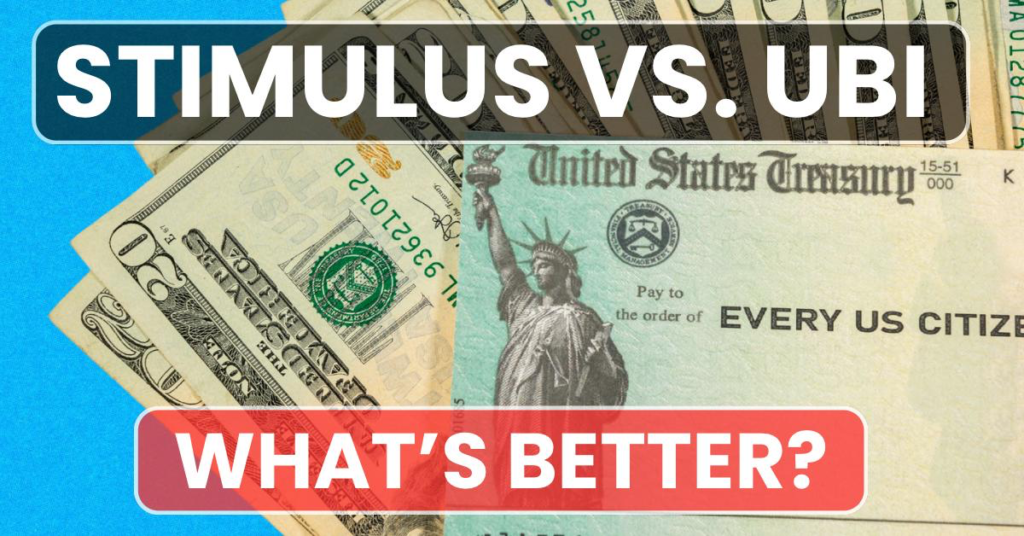Stimulus Checks vs. Universal Basic Income (UBI): Key Differences and Future Possibilities
When the COVID-19 pandemic hit the global economy, governments jumped in with emergency stimulus checks to help people stay financially afloat. However, there’s another idea that’s been quietly gaining steam: Universal Basic Income (UBI). This radical concept promises regular, unconditional cash payments to everyone. While both aim to ease financial stress, they have very different philosophies, structures, and long-term implications. This article will break down everthing you need to know about Stimulus Checks vs. Universal Basic Income (UBI) why they matter, and what they tell us about the future of economic security.
Also read, How Inflation is effecting stimulus checks and is eating into your funds and savings.

Stimulus Checks: The Crisis-Driven Lifelines
Stimulus checks are like financial lifelines that governments give out during tough economic times. They’re like a helping hand to people and businesses to get back on their feet. For example, the U.S. government sent direct payments to individuals and families during the COVID-19 pandemic to ease their financial struggles and get the economy moving again.
- The U.S. sent out three rounds of checks during the pandemic, giving each person a total of $3,200.
- In 2008, the government gave out tax rebates of $300 to $1,200 to boost spending.
Key Traits of Stimulus Checks:
- Stimulus checks are reactive and are only deployed when the world’s on fire or there is an emergency (recessions, natural disasters, or pandemics).
- Stimulus checks are usually not available to higher earners (e.g., those making over $75k).
- Political Hurdles: Require legislative approval, leading to delays and partisan battles.
- Pros:
- Immediate relief for those hit hardest.
- Boosts consumer spending to revive economies.
- Cons:
- Temporary fixes don’t address systemic inequality.
- Bureaucratic bottlenecks exclude vulnerable groups.
Universal Basic Income (UBI): A Paradigm Shift
Universal Basic Income (UBI) is a concept that offers regular, unconditional cash payments to all citizens, regardless of their income. Advocates and pilot programs are excited about its potential to reduce poverty and provide financial security for everyone.
- Alaska’s Permanent Fund Dividend is a yearly gift of oil revenue shares, ranging from $1,000 to $2,000, that’s been happening since 1982.
- In Stockton, California, a unique experiment was conducted from 2019 to 2021. They provided $500 per month to 125 residents, and guess what? This simple act had a remarkable impact! It not only reduced unemployment but also significantly improved the mental health of these individuals.
Key Traits of Universal Basic Income (UBI):
- UBI is a Proactive payment scheme and aims to provide ongoing support for all citizens regardless of economic conditions.
- UBI payments are meant to be unconditional, there are no work requirements or means testing involved.
- UBI aims to provide a simpler welfare with a single payment replacing a bunch of different aid programs.
- Pros:
- Reduces poverty and financial anxiety long-term.
- Empowers individuals to invest in education, entrepreneurship, or caregiving.
- Cons:
- High cost: A U.S.-wide UBI of $1,000/month could cost $3.9 trillion annually.
- Risk of inflation if not paired with tax reforms.
Stimulus Checks vs Universal Basic Income at a Glance
| Factor | Stimulus Checks | Universal Basic Income (UBI) |
|---|---|---|
| Purpose | Crisis relief | Ongoing economic security |
| Frequency | One-time or occasional | Monthly/regular |
| Eligibility | Income-based or situational | Unconditional (all citizens) |
| Funding Source | Emergency borrowing/taxes | Tax reforms (e.g., wealth, carbon taxes) |
| Political Viability | Bipartisan in crises | Polarizing; seen as “socialist” or “utopian” |
Case Study: How COVID-19 Exposed the Limits of Stimulus Payments
The pandemic exposed how easily stimulus-based aid can be undermined by factors like delays in distribution, fraud, and targeting issues. Many eligible recipients got stuck in bureaucratic red tape, while some funds went to the wrong people or were even stolen by scammers. And let’s not forget about inflation and supply chain disruptions, which made direct payments less effective in stabilizing the economy..
- Many payments were Delayed and citizens waited months for checks due to outdated IRS systems.
- I was noted that Undocumented immigrants, college dependents, and homeless individuals often slipped through the cracks.
On the other hand, UBI payments during the COVID-19 pandemic (like Chicago’s Resilient Communities Program) seemed to work better and had a bigger effect.
The Future: Could UBI Replace Stimulus Checks?
As automation and climate change threaten job security, Universal Basic Income (UBI) is gaining popularity. Here’s everything you need to know about Universal Basic Income:
- 1. Technological Unemployment-AI and robotics could displace 85 million jobs by 2025 (World Economic Forum). UBI advocates argue it’s a safety net for the post-work era.
- 2. Climate Crisis – Natural disasters demand rapid financial support. UBI could offer stability amid increasing climate shocks.
Challenges encountered during the implementation of UBI:
- Funding: Implementing UBI requires funding which could come from taxing tech giants, carbon emissions, or the wealthy.
- Public Trust: Skepticism around people persists about “free money” which encourages laziness, despite studies debunking this myth.
What Experts Say have to say about Stimulus Checks vs. Universal Basic Income (UBI)
- Andrew Yang (UBI Advocate): “Automation is why we need UBI. Stimulus checks are just Band-Aids.”
- Janet Yellen (U.S. Treasury Secretary): “Targeted relief remains essential, but we must rethink long-term safety nets.”
Conclusion
Stimulus checks and UBI are two different ways to give people money. They act asa quick fix for a crisis, while UBI is like a safety net for everyone. Stimulus checks might still be needed in the future, but UBI could be a game-changer in a world that’s always changing. Maybe we can combine the best of both ideas and create a system that helps everyone stay financially secure.
Could UBI work in your country? Share your views and Comment below!


